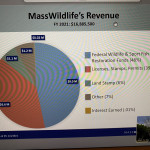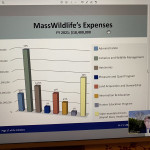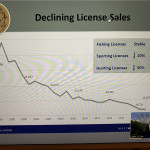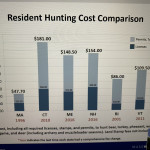Tuesday, February 9 at 6:30 p.m. Join the Zoom session using your computer, tablet, or smartphone by clicking this link with Passcode u5S0rA, or you can join by phone by calling 1-929-205-6099 and entering the Meeting ID: 841 5314 1920 and Passcode: 564737 when prompted.
For the first time since 1996, MassWildlife is considering an increase in hunting and fishing license fees to ensure the continued conservation, protection, and management of wildlife, fish, and plants in Massachusetts for the benefit and enjoyment of the public. The public can learn more about MassWildlife’s programs and services, how MassWildlife is funded, and why a license increase is needed by attending one of three virtual information sessions (Feb. 4, 6, or 9.) For more information, visit mass.gov/masswildlife-funding
The following are notes from Wayne Adams, from the 2/4 session
The format of the session is as follows:
– Introductions of those in the webinar for DFW , led by Ron Amidon, Mark Tisa, and moderated by Susan Saco
– Mark Tisa presents the history, milestones, accomplishments, breadth, and current revenues/expenses of DFW; also comparison of MA fees with 5 other NE states fees.
– Throughout the session, sportsmen and sportswomen are thanked/appreciated, clubs, and leagues as well
The session will then open up for questions and answers, as well as suggested ideas DFW should research further to increase participation in hunting and fishing, and directly/indirectly raise revenues without detriment. Fishing license revenues have been holding steady, while both hunting licenses and combo hunting/fishing licenses are decreasing. The outlook for future licenses revenue has challenges as more sportspeople become age eligible for 1/2 price licenses and free licenses. There are many expenses the department must bear that are beyond their control that are eroding the DFW reserve fund – such as healthcare. The department outlook and forecast is that in a few short years, the expenses will be more than revenues and the reserve fund will be depleted.
The next steps by DFW is to make recommendations to the DFW Board on Feb 17th. Based on decisions, formal public hearings will be held and recommendations to change fees through the legislature would be made.
Following are a list of suggestions made in the Thursday session that could drive revenues; these are suggestions from the attendees, like you and me.
– several individuals, clubs, and leagues are in favor of moderate license increases, since the last increase was in 1996.
– several comments were suggested to retain lower cost youth hunting licenses due to their limited income
– several comments suggesting new stamps be created – trout, pheasant
– several comments suggesting non-hunting public who use WMAs get parking permits, usage permits
– several comments to increase the hunter ed classes since some can not get started
– comment to create a regional/multi-state fishing license
– pass longstanding legislation that gets passed over year after year : crossbows for everyone; reduce archery setbacks; Sunday hunting
– update legislation to support new advances and interests in sporting equipment; air rifles; firestick inline muzzleloader
– pass legislation that allows DFW to increase fees in alignment with rate of inflation
– programs to help private landowners understand wildlife management practices and permit hunting on their land
– improve relationship with DCR to retain and expand access to protected land, instead of reducing access like Ware River watershed plan is calling for
– retain the core principles of science-based regulations; don’t yield to social justice/political motivations
– restrictive firearm laws can create a hurdle for out of state hunters, e.g. out of state friend/relative needs a FID to hunt with a borrowed firearm.
As with many good ideas, there is a pro and con, or a concern
– if fees are raised, will there be some sportspeople fallout ; can sportspeople receiving 1/2 price licenses or free licenses fit a fee into their fixed income
– if revenues are generated for WMA from the non-hunting/fishing public, will there be increased pressure to limit sportspeople use of the WMA in favor of other forms of outdoor recreation; e.g. bird watching, dog walking, etc




